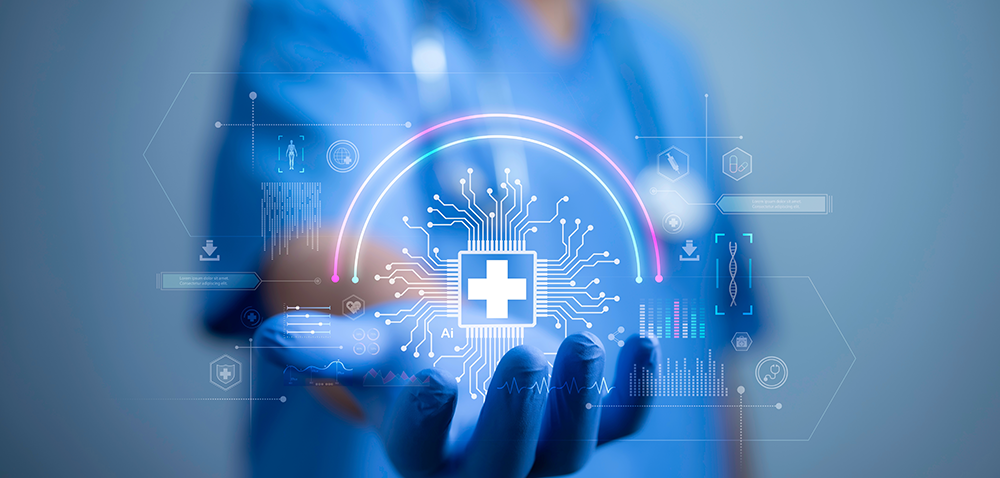What is the Role of AI in Healthcare Analytics?

Table of content
1. AI in Healthcare
2. What is Healthcare Analytics?
3. Importance of Health Data Management
4. Applications of AI in Healthcare Analytics
5. Benefits of AI in Healthcare Analytics
6. Challenges and Considerations
7. The Role of Data Analysts in AI-Driven Healthcare Analytics
8. Future of AI in Healthcare Analytics
9. Conclusion
AI in Healthcare
Artificial Intelligence (AI) is reshaping the healthcare industry by offering innovative solutions to complex challenges. From enhancing diagnostic accuracy to optimizing operational efficiency, AI has become a cornerstone of modern healthcare. With the increasing volume of healthcare data, leveraging AI-driven analytics has enabled organizations to deliver better patient outcomes, reduce costs, and improve decision-making processes. This article explores the transformative role of AI in healthcare analytics and its potential to revolutionize the industry.
What is Healthcare Analytics?
Healthcare analytics involves collecting, processing, and analyzing healthcare data to gain actionable insights. By using data analytics techniques, healthcare professionals can improve patient care, optimize resources, and enhance operational efficiency. Key areas of healthcare analytics include predictive analytics, clinical analytics, and operational analytics, which help forecast patient outcomes, improve diagnoses, and streamline hospital management.
The power of data science lies in its ability to uncover patterns and trends through machine learning and AI, enabling personalized care, better predictions, and enhanced decision-making. This approach reduces costs, minimizes errors, and improves outcomes by making healthcare operations more efficient and data-driven.
Key Elements of Healthcare Analytics
Data Automation
Data automation is a crucial advancement in healthcare analytics, allowing data collection, cleaning, and processing to be done automatically, reducing human error and improving efficiency. Automated systems can quickly organize and integrate data from various sources, ensuring real-time access to actionable insights.
Data Cleaning
Data cleaning is a vital part of healthcare analytics to ensure that the data used for analysis is accurate and reliable. Clean data removes inconsistencies, errors, and duplicates, allowing healthcare providers to make well-informed decisions. The process helps maintain high-quality, actionable datasets for better predictive models and outcomes.
Importance of Health Data Management
Health data management is essential to the success of healthcare analytics. It ensures that data is collected, stored, and organized securely and is compliant with regulations like HIPAA. Effective management systems integrate data from electronic health records (EHRs), wearables, and other clinical sources, providing healthcare professionals with a comprehensive view of a patient’s health status.
With the growing volume of healthcare data, automation, data cleaning, and AI will increasingly drive real-time data processing, predictive modeling, and better healthcare management. These technologies maximize the value of data, improve decision-making, and ultimately lead to better patient care and operational efficiencies.
Applications of AI in Healthcare Analytics
Traditional Methods vs. AI-Driven Approaches
Traditional analytics methods often rely on manual data processing, which is time-consuming and prone to errors. In contrast, AI-driven approaches use machine learning and AI algorithms to analyze vast datasets quickly and accurately. This allows healthcare providers to identify insights and trends that would be difficult or impossible to uncover with traditional methods.
Predictive Analytics
AI-powered predictive analytics uses historical and real-time data to forecast patient outcomes. For example, predictive models can help identify patients at high risk of readmission, enabling healthcare providers to take preventive actions, and reducing readmissions and overall healthcare costs. AI models can also predict disease progression and assist in early diagnosis, improving long-term patient care.
AI-Powered Diagnostic Tools
AI has revolutionized diagnostics by enhancing accuracy and speed. Tools like image recognition software can detect anomalies in medical scans, such as tumors or fractures, with a high degree of precision. These AI-powered diagnostic tools assist doctors in making informed decisions, leading to quicker and more accurate diagnoses, and ultimately improving patient care.
AI in Healthcare Management
AI plays a significant role in streamlining administrative functions like scheduling, billing, and resource allocation. By automating routine tasks, healthcare organizations can reduce operational inefficiencies, allowing staff to focus on patient care. This increases overall productivity and enhances the patient experience by reducing wait times and ensuring optimal use of resources.
Benefits of AI in Healthcare Analytics
AI offers numerous advantages that significantly enhance the quality of healthcare services:
1. Enhanced Patient Outcomes
AI enables personalized treatment plans by analyzing patient data, including genetics and lifestyle factors. This tailored approach leads to early detection of diseases, allowing healthcare providers to intervene at the most effective stage. AI models also help predict patient outcomes, improving the ability to deliver proactive care and reduce the risk of complications.
2. Operational Efficiency
AI helps streamline healthcare operations by automating repetitive tasks such as data entry, scheduling, and patient billing. It optimizes resource allocation, ensuring that healthcare facilities make the best use of their staff, equipment, and supplies. This reduction in administrative burden allows healthcare professionals to focus more on patient care.
3. Cost Reduction
AI contributes to cost reduction by minimizing human errors and inefficiencies in healthcare operations. By automating routine processes and improving decision-making, AI reduces the need for costly manual interventions. Additionally, it enhances the accuracy of medical billing, resource planning, and treatment protocols, leading to better financial management.
4. Data-Driven Decision Making
AI’s ability to process vast amounts of healthcare data quickly and accurately allows for data-driven decision-making. It identifies hidden patterns and insights within the data, helping healthcare providers make more informed clinical and operational decisions. This improves overall patient satisfaction and trust, as decisions are based on accurate, real-time data.
5. Predictive Analytics for Proactive Care
AI’s predictive capabilities help in identifying potential health risks, allowing healthcare providers to take preventive actions before conditions worsen. For example, AI can identify patients at risk of readmission or those who may develop chronic conditions, leading to more targeted interventions and improved outcomes.
6. Improved Diagnosis Accuracy
AI-powered diagnostic tools, including image recognition software, improve diagnosis accuracy by detecting medical conditions like tumors, fractures, and infections earlier and with greater precision than traditional methods. This leads to better treatment outcomes and minimizes the chances of misdiagnosis.
7. Enhanced Remote Monitoring
AI enables remote monitoring of patients through wearables and IoT devices, which provide continuous health data. This is particularly beneficial for managing chronic conditions like diabetes or hypertension. It allows healthcare providers to offer timely interventions, reducing the need for frequent hospital visits and improving overall patient care.
AI’s ability to process vast amounts of data quickly allows healthcare providers to make data-driven decisions, ultimately leading to improved patient satisfaction and trust.
Challenges and Considerations
Healthcare Data Privacy
Maintaining data privacy is a significant challenge in AI-driven healthcare analytics. Ensuring compliance with regulations like HIPAA is crucial to safeguard sensitive patient data and prevent unauthorized access while utilizing AI technologies to enhance patient care.
Ethical Considerations
AI in healthcare must be developed ethically to avoid biases in decision-making. Ensuring fairness and transparency is essential for creating equitable AI models that treat all patients fairly, regardless of their background or demographic.
Adoption and Training
Adopting AI requires significant investment in infrastructure and employee training. Healthcare teams need continuous upskilling to efficiently use AI tools and integrate them into daily workflows. Pangaeax solves this problem by providing expert freelance data analysts and data scientists, ensuring healthcare organizations have access to highly skilled professionals who can help train staff and implement AI tools effectively. This approach reduces the barriers to adopting new technologies and accelerates the learning curve for healthcare providers.
The Role of Data Analysts in AI-Driven Healthcare Analytics
Medical Data Analysts
Data analysts play a pivotal role in AI-driven healthcare analytics by extracting meaningful insights from complex healthcare datasets. Their expertise in data cleaning, organization, and interpretation ensures that AI models are fed with accurate data and that these models deliver effective, reliable results. Medical data analysts also monitor AI models to ensure they remain accurate over time, making necessary adjustments when required.
Data Science in Healthcare
The integration of AI in healthcare has significantly increased the demand for skilled data scientists. These professionals develop and train machine learning algorithms tailored to the needs of healthcare providers. Data scientists work closely with healthcare teams to ensure AI tools are aligned with clinical goals, from improving patient care to optimizing hospital operations. They also help to interpret AI model results and turn them into actionable insights that healthcare providers can use to make data-driven decisions.
Best Platforms for Hiring Healthcare Data Analysts
To implement AI-driven analytics effectively, healthcare organizations need skilled data analysts. Pangaeax provides a platform where you can hire freelance data analysts and freelance data scientist experts specializing in healthcare data analytics. These professionals offer high-quality results for AI projects, ensuring that healthcare organizations can successfully integrate AI technologies into their operations. By leveraging the expertise available on Pangaeax, healthcare providers can make data-driven decisions, improve patient care, and enhance operational efficiency.
Future of AI in Healthcare Analytics
The future of AI in healthcare analytics is set to revolutionize patient care, improve operational efficiency, and drive innovation in treatment plans. Below are some key points:
Healthcare Technology Innovations
AI integration with blockchain and IoT enhances data security and interoperability. IoT devices offer real-time health monitoring, while blockchain ensures secure, transparent data sharing across systems, improving patient care and operational efficiency.
Personalized Medicine
AI-driven analytics enables personalized medicine, tailoring treatments to individual patients based on genetics and lifestyle factors. This leads to more precise therapies, reduced side effects, and better patient outcomes.
Predictive Analytics
AI-powered predictive analytics will become increasingly accurate in forecasting disease outbreaks, treatment responses, and patient outcomes. This will optimize resource allocation and improve public health strategies by allowing proactive interventions.
AI-Powered Virtual Healthcare
AI is driving virtual healthcare, allowing patients to access consultations remotely. Virtual assistants and AI chatbots improve accessibility, reduce the burden on healthcare systems, and enhance patient care in underserved areas.
AI for Drug Discovery and Clinical Trials
AI accelerates drug discovery and improves clinical trials by analyzing medical data and identifying potential candidates quickly, leading to faster development of new treatments.
Enhanced Remote Monitoring
AI enables remote patient monitoring through wearables, helping manage chronic conditions like diabetes. This improves patient outcomes by providing continuous care and reducing hospital readmissions.
Conclusion
AI is transforming healthcare analytics by addressing traditional challenges and providing innovative solutions. From enhancing data security to improving patient outcomes, AI’s potential in healthcare is immense. Healthcare providers should embrace AI-driven tools and platforms like Pangaea X to stay ahead of the curve and deliver high-quality care. By investing in AI and utilizing expert freelance data analysts and data scientists from platforms like Pangaea X, the industry can achieve more efficient, accurate, and secure data management, ultimately benefiting both patients and providers.
Get your data results fast and accelerate your business performance with the insights you need today.



